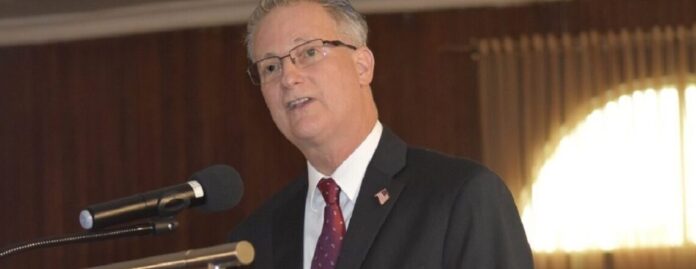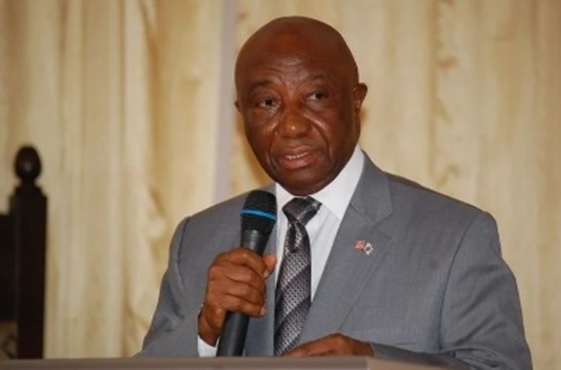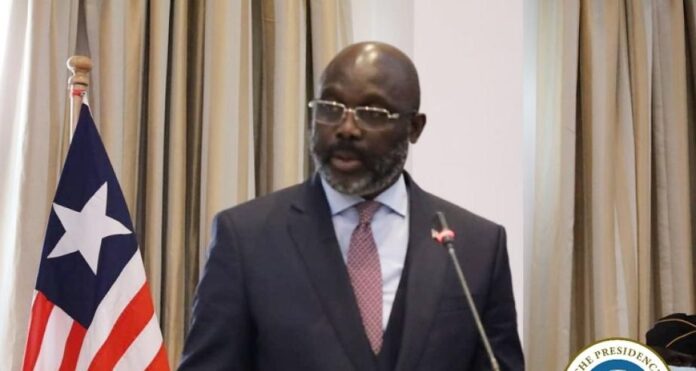MONROVIA – The outgoing US Ambassador to Liberia, Michael McCarthy has revealed that the Liberian workers, who work for him at his official residence and others who work directly within the embassy, are not happy with their government as it relates to taxes that are deducted from their earnings. According to him, those Liberians don’t see where their monies are going.
The US senior diplomat in Liberia made the disclosure when he addressed the Liberian Media at his final press roundtable on Tuesday, July 11.
Amb. McCarthy said: “The Liberians who work for me at the Residence and at the Embassy continue to be unhappy. They are now paying income tax, but they don’t see where the money is going.”
The US Embassy Liberian staffers are among some of the high Liberian earners, who are blessed to be employed in a country where unemployment is rife; and the inflation rate increased by 6.1 percent in March 2023.
Talking about his staffers’ concern, the US Ambassador then told the Liberian Media: “Which brings me to something we’ve discussed before – your role as in following the money. Never hesitate to ask what is happening with taxpayer funds — that is your money! It doesn’t belong to the LRA [Liberia Revenue Authority], it doesn’t belong to the Ministry of Finance and Development Planning, it doesn’t belong to the Administration, and it doesn’t belong to Parliament. It belongs to the PEOPLE!”
Mentioning the legislature as being one of the entities that Liberian taxpayers’ monies are funneled through or which take a huge portion of the “national cake” for their own use, the Ambassador clarified an earlier allegation he had made against the legislature.
“Second, I discovered that I used the wrong figure in my press release after my last trip to the Southeast. I wrote that Parliament had spent $65 million on itself in Fiscal Year 2022. That was the wrong figure. From the unaudited Statement of Consolidated Fund Account of the Calendar Year 2022, -released by the Ministry of Finance and Development we can now see that the correct figure was $90.8 million for Parliament in FY22, out of a total budget of $811.6 million, or 11 percent of the total budget.”
On April 24, 2023, the Ambassador issued a press release in which he among other things said the legislators had used a whooping US$65 million on themselves alone when very important entities in the country are striving for needed resources.
“It was striking that the further I went from Monrovia, the more elaborate and explicit were the reasons given for the lack of funding from the central government. ‘Oh, it is challenging for the government these days. Oh, Putin’s war has made everything more difficult. Prices have dried up the budgets. You donor partners must fill the gaps.’
I wonder if these people are aware that, much to their credit, the LRA has surpassed projections and increased revenues for the past four years, climbing from US$435,682 million in 2019 to US$605,005 million in 2022? I suspect the country folk don’t know that the Liberian economy grew by 3.7% in 2022.
And I am quite sure they have not been told that the legislature has spent more every year for the past three years buttering their own bread, allocating over US$65 million in 2022 for salaries and operations. That’s correct – while hospitals went without, and service centers withered on the vine, the 30 senators and the 73 representatives spent sixty-five million U.S. dollars feathering their own nests.”
“We withhold 25% of the salaries of our Liberian employees at the Residence and at the Embassy to pay their legally mandated income tax to the LRA. Why are the much better-paid representatives and senators not paying a full 25% of their salaries? Why are legislators and ministers, those living on the top of the heap, given annual duty-free imports that deny the LRA much-needed additional revenue? Is there any reason other than the perverted version of the Golden Rule – ‘those that have the gold, make the rules’?
U.S. taxpayers spend around US$60 million a year on health care in Liberia, and another US$23 million on education. The same legislature that spent US$65 million on itself in 2022 appropriated around US$7.1 million for grants and subsidies to county health facilities and US$2.76 million for operations at basic and secondary education (although, as we saw, that doesn’t mean the funds reached their intended destinations).
But if the legislature could just appropriate an additional US$10 million a year to primary education (for a country that is tied in last place for average days of school attendance), and an additional US$10 million a year for county hospitals, even the greatest cynics concede that it would make a big difference.
Just US$500,000 each per year of actual maintenance (not make-believe budgeted funds) on four unpaved roads (Zorzor – Voinjama; Zwedru – Fishtown; Greenville – Barclayville City; and Greenville – Buchanan) would dramatically improve the lives of more than a million of Liberia’s poorest citizens, lowering food costs, revolutionizing farm to market access, and eliminating seasonal shortages of life-saving medicines and equipment. The legislature would still have US$43 million a year to somehow get by. Anyone interested in a pro-poor agenda?” IPNEWS







